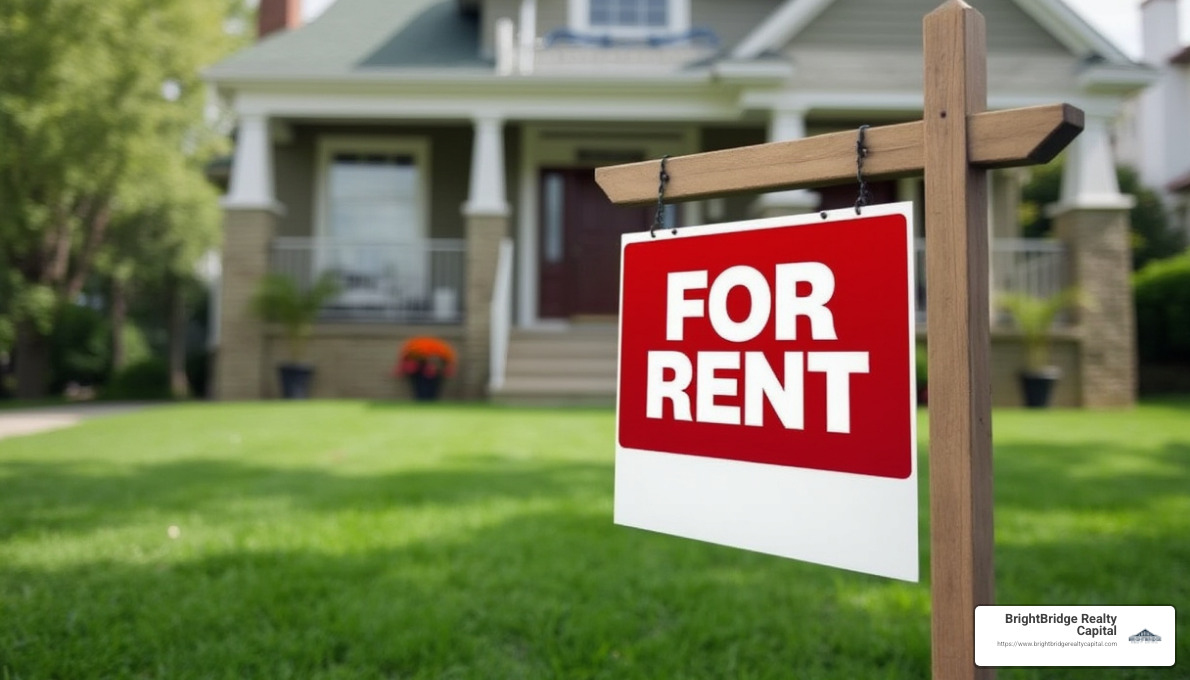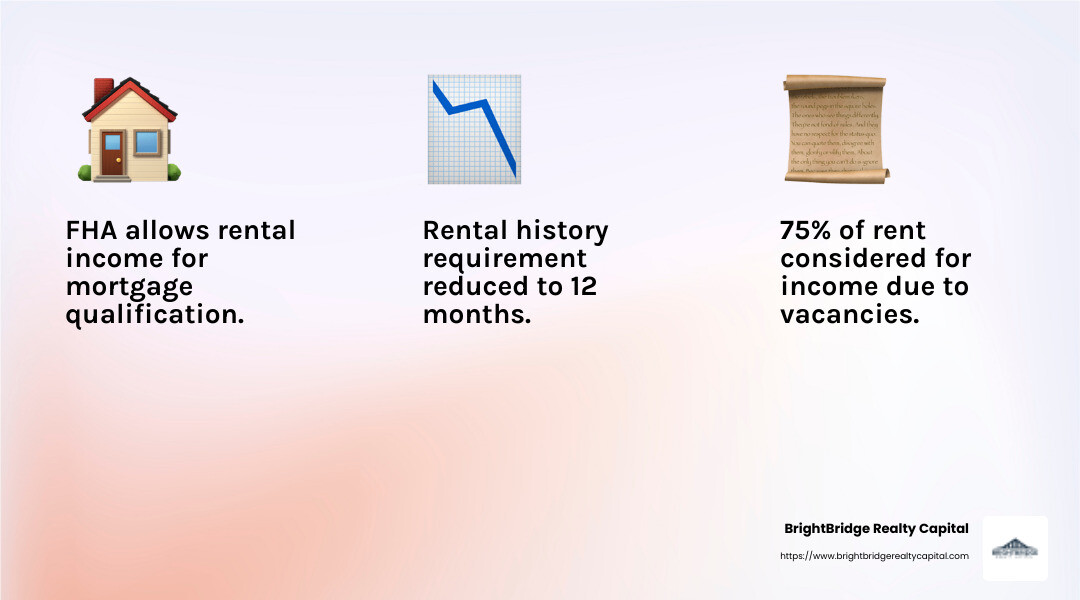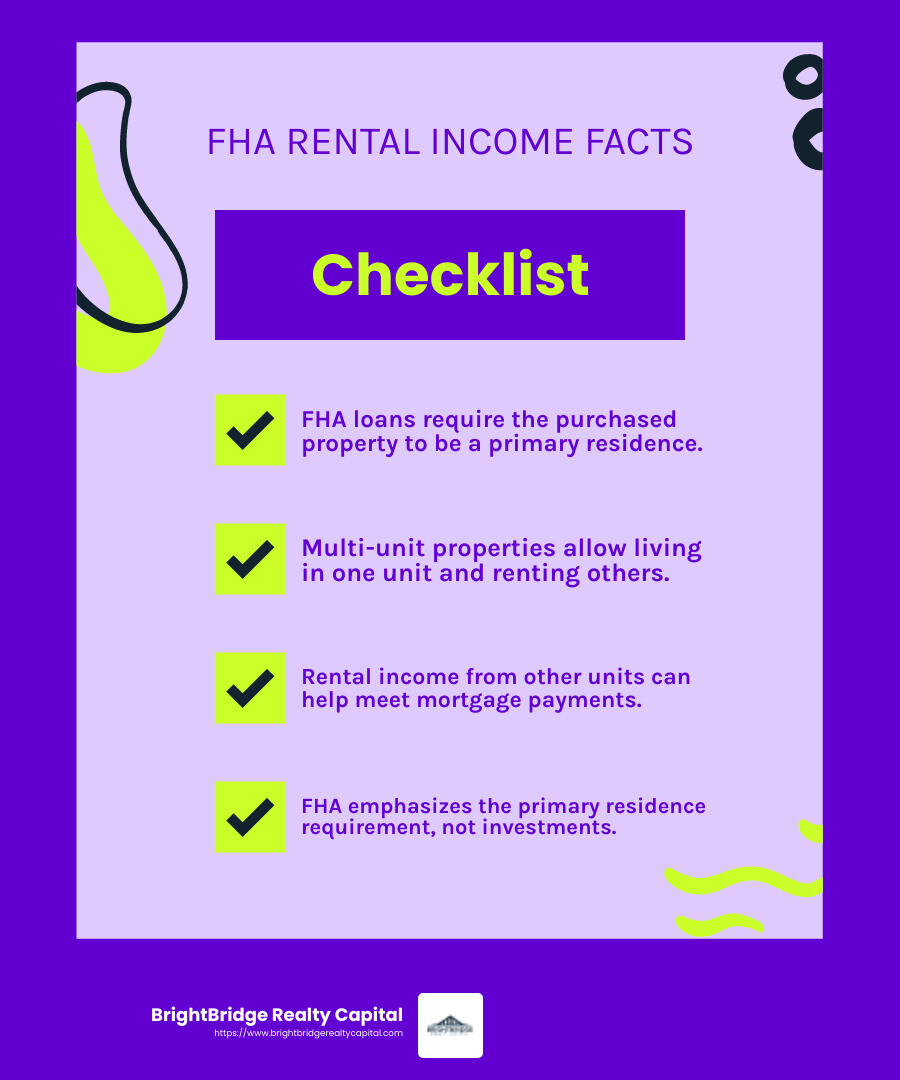Maximize Your FHA Loan Potential with Rental Income Insights

FHA rental income is a powerful tool when qualifying for a mortgage, especially for those looking to combine investment opportunities with homeownership. If you're a real estate investor keen on expanding your rental portfolio, understanding how FHA loans accommodate rental income can be a game-changer. FHA loans allow borrowers to count rental income as part of their overall income, subject to specific rules and documentation requirements outlined in the HUD 4000.1 guidelines.
Here are the key points about FHA rental income:
- Eligibility: Rental income can qualify for FHA loans if it comes from a one- to four-unit property, with one unit being the borrower's primary residence.
- Documentation: To use rental income, lenders require proof such as tax forms, bank statements, and a robust lease agreement.
- Calculation: Typically, lenders consider 75% of the fair market or actual rent as effective income to account for potential vacancies and maintenance costs.
Investors and homebuyers can leverage these insights to steer the FHA loan process more strategically. Understanding these foundations can offer you a stable path to new property acquisitions, maximizing your potential in the real estate market.

Simple guide to fha rental income:
- fha loan and renting property
- fha rental income departing residence
- freddie mac rental income primary residence
Understanding FHA Rental Income
FHA rental income can be a crucial factor in securing a mortgage, particularly for those who want to blend homeownership with investment opportunities. Let's break down how this works:
FHA Guidelines
The Federal Housing Administration (FHA) allows borrowers to include rental income when qualifying for a mortgage. This is especially useful for those purchasing a one- to four-unit property, as long as one unit is the borrower's primary residence. The FHA's draft Mortgagee Letter proposes changes to make using rental income even more accessible. For example, the required rental history has been shortened from two years to just 12 months. This change opens the door for more borrowers to qualify.
Boarder Income
Boarder income, or rental income from individuals living in your home, is included under FHA guidelines. Under the new proposal, borrowers need to show they've received boarder income for at least nine of the past 12 months. This income must also be currently received and can be averaged over a 12-month period. Additionally, the FHA proposes a cap: rental income cannot exceed 30% of the borrower's total monthly effective income. This ensures that the rental income supports rather than overshadows the borrower's primary income.
Rental Income Calculation
When calculating rental income for FHA loans, lenders typically use what's called the 75% rule. This means they consider 75% of the lesser amount between the fair market rent and the actual lease agreement rent. This adjustment accounts for potential vacancies and maintenance costs. For example, if the fair market rent is $1,000 but your lease states $950, lenders will take 75% of $950 as your effective income.

By understanding these FHA rental income guidelines, borrowers can better position themselves to qualify for a mortgage. The streamlined documentation process and reduced rental history requirement make it easier than ever to leverage rental income. This can be a significant advantage in navigating the real estate market and achieving your homeownership and investment goals.
How to Qualify for an FHA Loan Using Rental Income
Qualifying for an FHA loan using rental income involves meeting specific documentation and verification criteria. Here's a simple breakdown:
Documentation Requirements
To use rental income for an FHA loan, you'll need to provide several key documents. These include:
Lease Agreements: A valid lease agreement is crucial. It should clearly state the rent amount and be signed by both you and your tenant.
Fannie Mae and Freddie Mac Forms: Specifically, you'll need the Uniform Residential Appraisal Report, Single Family Comparable Rent Schedule, and Operating Income Statement. These forms help lenders verify fair market rent and operating income.
Bank Statements: Show proof of rental income deposits. This helps verify that the rental payments are being made consistently.
Receipts or Escrow Account Statements: These can further confirm rental income, especially the security deposit or first month's rent.
Rental History
The FHA has made it easier to qualify with rental income by reducing the rental history requirement from two years to 12 months. You need to prove you've received rental income for at least nine out of the past 12 months. This change allows more borrowers to leverage rental income sooner.
Verification Options
Lenders need to verify that your rental income is reliable. Here are some ways they do this:
Bank Statements and Canceled Checks: These documents show consistent rental income deposits.
Deposit Slips: They offer a straightforward way to prove rental income.
Lease Agreement Annotations: Ensure your lease agreement notes the receipt of security deposits or rent, initialed by both parties.
By meeting these documentation and verification requirements, you can effectively use rental income to qualify for an FHA loan. This approach not only strengthens your mortgage application but also broadens your homeownership possibilities.
FHA Rental Income Calculation
Understanding how FHA rental income is calculated is key to maximizing your mortgage qualification potential. Here's a breakdown of the main components involved:
Effective Income
Effective income is the amount of rental income that lenders consider when evaluating your FHA loan application. But it's not as simple as taking the full rent amount. Lenders typically use only 75% of your rental income. This accounts for potential vacancies and maintenance costs.
For example, if your lease agreement states a monthly rent of $1,000, lenders will consider $750 as your effective income. This ensures they only count income likely to be stable and reliable.
Fair Market Rent
Before lenders can determine your effective income, they need to know the fair market rent of your property. This is an estimate of what your property could rent for on the open market, based on its location, features, and comparable properties.
Lenders often rely on an appraiser's report to determine the fair market rent. They will then use the lesser of 75% of the fair market rent or 75% of the actual rent from your lease agreement. This conservative approach ensures lenders account for any discrepancies between market conditions and your current lease.
Lease Agreements
A solid lease agreement is crucial for calculating rental income. It should clearly outline the rent amount, lease term, and be signed by both you and the tenant. This document serves as proof of the rental arrangement and provides lenders with the necessary details to verify your income.
To further support your application, make sure your lease agreement includes annotations for any received security deposits or first month's rent, initialed by both you and the tenant. This helps confirm the legitimacy and commencement of the rental arrangement.
By understanding these key elements, you can better steer the FHA rental income calculation process. This knowledge allows you to present a strong case to lenders and maximize your potential for mortgage qualification.
Key Considerations for Using Rental Income
Using FHA rental income to qualify for a new mortgage can be highly advantageous, but there are several important factors to consider. Understanding these can help you steer the process smoothly.
Equity Requirements
One of the main requirements when using rental income from your current home is having sufficient equity. Specifically, you need at least 25% equity in your departing residence. This is crucial because lenders see equity as a buffer against market fluctuations and a sign of financial stability.
To verify your equity, an appraisal of your property will be required. The appraisal will assess the current market value of your home and help determine if you meet the 25% threshold.
Relocation Distance
The 100-mile rule is a critical factor when planning to use rental income for a new FHA loan. To qualify, you generally need to relocate more than 100 miles from your current home. This distance requirement ensures that your move is legitimate, often for reasons like a job change or need for a larger home, rather than just benefiting from rental income without actually relocating.
The rule helps lenders confirm that the new property will be your primary residence, not just an investment. If your move is within 100 miles, rental income might not be considered unless you're leaving a multi-unit property.
Multi-Unit Properties
Owning a multi-unit property can provide some flexibility. If you live in one unit and rent out the others, you can use rental income to qualify for a new mortgage even if your new home is within 100 miles. However, you must demonstrate experience in managing the rental aspects of your current residence.
This exception is beneficial for those who have successfully managed multi-unit properties, as it opens up more opportunities for using rental income without the strict relocation distance requirement.
By understanding these key considerations, you can better position yourself to leverage FHA rental income in your mortgage application process. This knowledge will help you meet lender requirements and potentially qualify for a more favorable loan.
Frequently Asked Questions about FHA Rental Income
Can FHA loans be used for investment properties?
FHA loans are primarily designed for purchasing a primary residence. This means that the property you buy with an FHA loan must be your main home. However, there are certain exceptions. For instance, if you purchase a multi-unit property, you can live in one unit and rent out the others. This allows you to earn rental income while still meeting the FHA's primary residence requirement.

What documentation is needed for rental income verification?
When using rental income to qualify for an FHA loan, lenders need to verify that this income is legitimate and reliable. To do this, you'll need to provide specific documentation:
Bank Statements: These should show the deposit of rent payments, proving that you actually receive the income.
Lease Agreements: A clear, signed lease agreement is crucial. It should detail the monthly rent amount, the lease term, and other relevant terms. This document serves as proof of the rental arrangement and the expected income.
Security Deposit Verification: Proof of the tenant's security deposit or first month's rent can further confirm the legitimacy of the rental income. This might include bank statements or receipts.
How does the 100-mile rule affect rental income qualification?
The 100-mile rule is an important consideration when using rental income to qualify for an FHA loan. This rule generally requires you to relocate more than 100 miles from your current home to count rental income from your previous residence. The idea is to ensure that the move is genuine, perhaps due to a job change or the need for a larger home.
This rule helps lenders confirm that the new property will truly be your primary residence. If you move within 100 miles, you might not be able to use rental income unless you're leaving a multi-unit property and have experience managing it.
Understanding these aspects of FHA rental income can help you steer the mortgage application process more effectively, ensuring you meet all necessary requirements.
Conclusion
Navigating FHA rental income can seem daunting, but with the right guidance, it becomes a powerful tool for maximizing your home-buying potential. At BrightBridge Realty Capital, we specialize in providing customized financing solutions that cater to your unique needs. Whether you're purchasing a multi-unit property or leveraging rental income from boarders, our team is dedicated to ensuring a seamless process.
Our expertise in real estate financing means we can offer competitive rates and fast closings, often within a week. This quick turnaround allows you to seize opportunities as they arise, without the delays commonly associated with traditional lending.
Choosing BrightBridge Realty Capital means choosing a partner committed to your financial success. We understand that every investment is a step towards building your future, and we're here to support you every step of the way.
For more information on how we can assist with your real estate financing needs, visit our BrightBridge Realty Capital page. Let's work together to turn your property dreams into reality.


